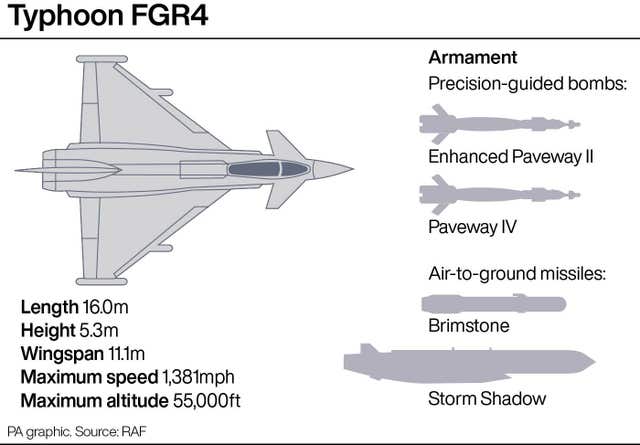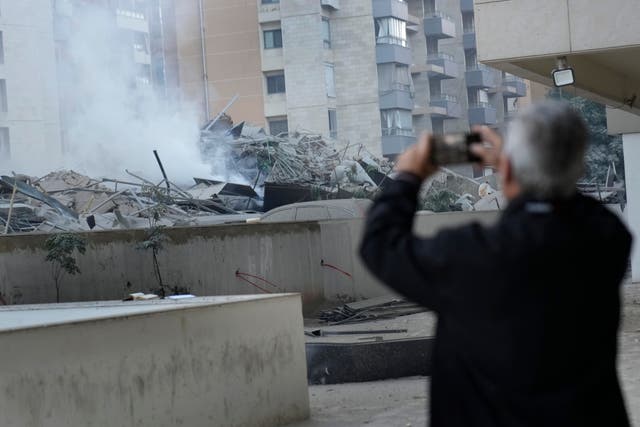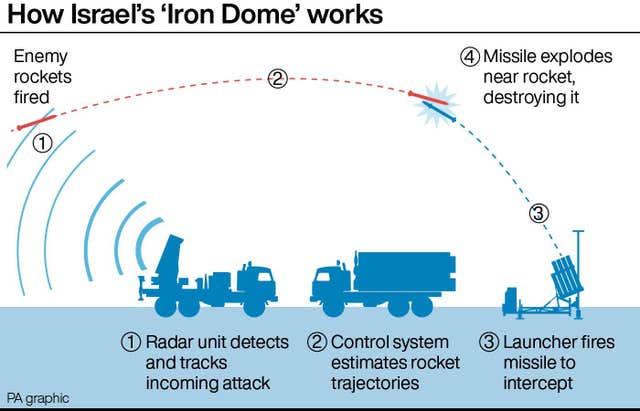British forces “played their part” in attempts to prevent further violence in the Middle East, the Defence Secretary has confirmed, after Sir Keir Starmer said he stands with Israel following an attack on the country by Iran.
In a statement on Tuesday evening, John Healey said he “completely condemn(s) Iran’s attack against Israel”.
“British forces have this evening played their part in attempts to prevent further escalation in the Middle East,” he added.
“I want to thank all British personnel involved in the operation for their courage and professionalism.”
It is understood RAF jets were involved in the efforts to intercept the Iranian missiles targeted at Iran.

The operation was similar to the role carried out by the UK’s forces when Iran launched a drone and cruise missile barrage at Israel in April, when RAF Typhoons were involved in the defensive effort.
Earlier the Prime Minister had said he was “deeply concerned that the region is on the brink” and again urged British nationals in Lebanon to leave amid escalating violence in the Middle East.
Meanwhile, Britons fleeing Lebanon were set to board a UK Government-chartered flight to safety on Wednesday.
Mr Healey is visiting Cyprus to meet troops who are preparing for the possibility of evacuating British citizens from Lebanon.
A statement from Defence Secretary @JohnHealey_MP following Iran's attack against Israel tonight. pic.twitter.com/D3ESuHW4vk
— Ministry of Defence 🇬🇧 (@DefenceHQ) October 1, 2024
In a statement from Downing Street on Tuesday evening, Sir Keir said Iran has “menaced the Middle East for far too long” and called on the country to “stop these attacks”.
“We stand with Israel and we recognise her right to self-defence in the face of this aggression,” he said.
“Iran must stop these attacks. Together with its proxies like Hezbollah, Iran has menaced the Middle East for far too long, chaos and destruction brought not just to Israel, but to the people they live amongst in Lebanon and beyond.
“Make no mistake, Britain stands full square against such violence. We support Israel’s reasonable demand for the security of its people.”
Iran said it launched the strikes in retaliation for the killing of Hezbollah leader Hassan Nasrallah in Beirut last week, the Associated Press reported.
The escalation came after Israel began a ground offensive in Lebanon, carrying out what it described as “limited, localised” operations.
The Iranian attack on Israel began while Sir Keir was talking to Israel’s Prime Minister Benjamin Netanyahu on Tuesday, Downing Street said earlier.

In his statement on Tuesday evening, Sir Keir said he was “deeply concerned that the region is on the brink” and “deeply concerned about the risk of miscalculation”.
He repeated the advice for Britons in Lebanon to leave and said “we’re doing everything we can to get people out, but the situation is extremely volatile”.
A chartered flight to get Britons out of the country is due to depart from Beirut-Rafic Hariri International Airport on Wednesday, at a cost of £350 per seat.

Lebanon’s Middle East Airlines, the only commercial operator still flying from Beirut, has a regular scheduled flight to the UK leaving on Wednesday.
The attack on Israel by Iran has attracted condemnation from British political leaders.
Foreign Secretary David Lammy warned against a “cycle of escalation” and said it would be in “no-one’s interest”, while Conservative leader Rishi Sunak said “we stand unequivocally by Israel’s right to defend itself including against Hezbollah in Lebanon”.
Sir Keir spoke to other European leaders about the situation on Tuesday evening, condemning Iran’s attack and reiterating calls for a ceasefire in the region.
In a conversation with German Chancellor Olaf Scholz, “the leaders agreed that further escalation was in nobody’s interest and that all sides should show restraint”, a Downing Street spokesman said.
There was also a conversation with French President Emmanuel Macron, in which Downing Street said “the Prime Minister and president agreed that ensuring Israeli security was vital and that there was an urgent need for de-escalation, with all parties needing to show restraint”.
The Prime Minister also chaired a ministerial meeting in Downing Street on Tuesday on the situation in the Middle East.




Comments: Our rules
We want our comments to be a lively and valuable part of our community - a place where readers can debate and engage with the most important local issues. The ability to comment on our stories is a privilege, not a right, however, and that privilege may be withdrawn if it is abused or misused.
Please report any comments that break our rules.
Read the rules hereLast Updated:
Report this comment Cancel